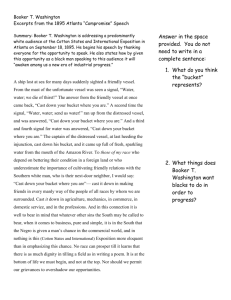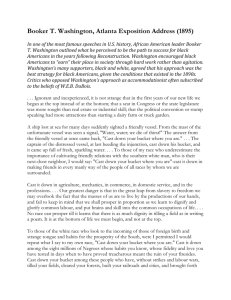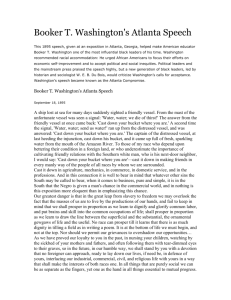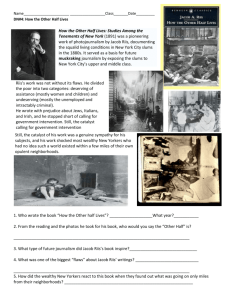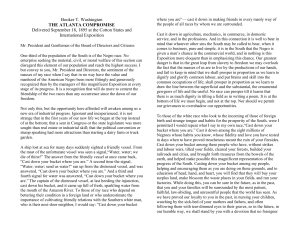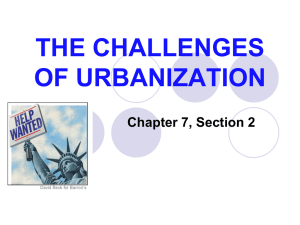Progressive Era Test Documents 2014ProgressiveReadings
advertisement
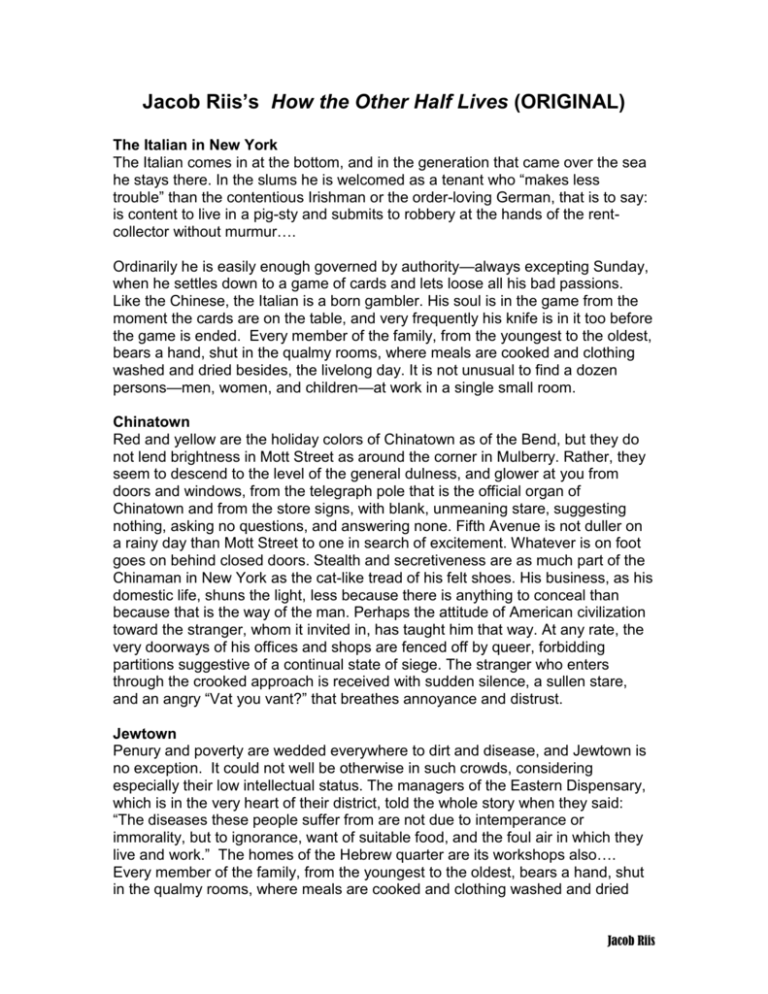
Jacob Riis’s How the Other Half Lives (ORIGINAL) The Italian in New York The Italian comes in at the bottom, and in the generation that came over the sea he stays there. In the slums he is welcomed as a tenant who “makes less trouble” than the contentious Irishman or the order-loving German, that is to say: is content to live in a pig-sty and submits to robbery at the hands of the rentcollector without murmur…. Ordinarily he is easily enough governed by authority—always excepting Sunday, when he settles down to a game of cards and lets loose all his bad passions. Like the Chinese, the Italian is a born gambler. His soul is in the game from the moment the cards are on the table, and very frequently his knife is in it too before the game is ended. Every member of the family, from the youngest to the oldest, bears a hand, shut in the qualmy rooms, where meals are cooked and clothing washed and dried besides, the livelong day. It is not unusual to find a dozen persons—men, women, and children—at work in a single small room. Chinatown Red and yellow are the holiday colors of Chinatown as of the Bend, but they do not lend brightness in Mott Street as around the corner in Mulberry. Rather, they seem to descend to the level of the general dulness, and glower at you from doors and windows, from the telegraph pole that is the official organ of Chinatown and from the store signs, with blank, unmeaning stare, suggesting nothing, asking no questions, and answering none. Fifth Avenue is not duller on a rainy day than Mott Street to one in search of excitement. Whatever is on foot goes on behind closed doors. Stealth and secretiveness are as much part of the Chinaman in New York as the cat-like tread of his felt shoes. His business, as his domestic life, shuns the light, less because there is anything to conceal than because that is the way of the man. Perhaps the attitude of American civilization toward the stranger, whom it invited in, has taught him that way. At any rate, the very doorways of his offices and shops are fenced off by queer, forbidding partitions suggestive of a continual state of siege. The stranger who enters through the crooked approach is received with sudden silence, a sullen stare, and an angry “Vat you vant?” that breathes annoyance and distrust. Jewtown Penury and poverty are wedded everywhere to dirt and disease, and Jewtown is no exception. It could not well be otherwise in such crowds, considering especially their low intellectual status. The managers of the Eastern Dispensary, which is in the very heart of their district, told the whole story when they said: “The diseases these people suffer from are not due to intemperance or immorality, but to ignorance, want of suitable food, and the foul air in which they live and work.” The homes of the Hebrew quarter are its workshops also…. Every member of the family, from the youngest to the oldest, bears a hand, shut in the qualmy rooms, where meals are cooked and clothing washed and dried Jacob Riis besides, the livelong day. It is not unusual to find a dozen persons—men, women, and children—at work in a single small room…. It has happened more than once that a child recovering from small-pox, and in the most contagious stage of the disease, has been found crawling among heaps of half-finished clothing that the next day would be offered for sale on the counter of a Broadway store. Source: Excerpts from Jacob Riis’s book How the Other Half Lives, 1890. Document A: Booker T. Washington (ORIGINAL) Ignorant and inexperienced, it is not strange that in the first years of our new life we began at the top instead of at the bottom; that a seat in Congress or the state legislature was more sought than real estate or industrial skill; that the political convention or stump speaking had more attractions than starting a dairy farm or truck garden. A ship lost at sea for many days suddenly sighted a friendly vessel. From the mast of the unfortunate vessel was seen a signal, “Water, water; we die of thirst!” The answer from the friendly vessel at once came back, “Cast down your bucket where you are.” A second time the signal, “Water, water; send us water!” ran up from the distressed vessel, and was answered, “Cast down your bucket where you are.” And a third and fourth signal for water was answered, “Cast down your bucket where you are.” The captain of the distressed vessel, at last heeding the injunction, cast down his bucket, and it came up full of fresh, sparkling water from the mouth of the Amazon River. To those of my race who depend on bettering their condition in a foreign land or who underestimate the importance of cultivating friendly relations with the Southern white man, who is their next-door neighbor, I would say: “Cast down your bucket where you are”— cast it down in making friends in every manly way of the people of all races by whom we are surrounded…. Cast it down in agriculture, mechanics, in commerce, in domestic service, and in the professions…. No race can prosper till it learns that there is as much dignity in tilling a field as in writing a poem. It is at the bottom of life we must begin, and not at the top. To those of the white race who look to the incoming of those of foreign birth and strange tongue and habits for the prosperity of the South, were I permitted I would repeat what I say to my own race, “Cast down your bucket where you are.” Cast it down among the eight millions of Negroes whose habits you know, whose fidelity and love you have tested… As we have proved our loyalty to you in the past, in nursing your children, watching by the sick-bed of your mothers and fathers, and often following them with tear-dimmed eyes to their graves, so in the future, in our humble way, we shall stand by you with a devotion that no foreigner can approach, ready to lay down our lives, if need be, in defense of yours, Jacob Riis interlacing our industrial, commercial, civil, and religious life with yours in a way that shall make the interests of both races one. In all things that are purely social we can be as separate as the fingers, yet one as the hand in all things essential to mutual progress. Source: Excerpt from Booker T. Washington’s ‘Atlanta Compromise’ speech, 1895. Document C (ORIGINAL) [A]n Italian girl who has had lessons in cooking at the public school will help her mother to connect the entire family with American food and household habits. That the mother has never baked bread in Italy–only mixed it in her own house and then taken it out to the village oven–makes all the more valuable her daughter's understanding of the complicated cooking stove. The same thing is true of the girl who learns to sew in the public school, and more than anything else, perhaps, of the girl who receives the first simple instruction in the care of little children–that skillful care which every tenement-house baby requires if he is to be pulled through his second summer…. Thus through civic instruction in the public schools, the Italian woman slowly became urbanized in the sense in which the word was used by her own Latin ancestors, and thus the habits of her entire family were modified. The public schools in the immigrant colonies deserve all the praise as Americanizing agencies which can be bestowed upon them, and there is little doubt that the fast-changing curriculum in the direction of the vacation-school experiments will react more directly upon such households. Source: Excerpt from Jane Addams’ book, Twenty Years at Hull-House, (1910). This passage comes from a chapter called "Immigrants and Their Children.” Jacob Riis Jacob Riis
